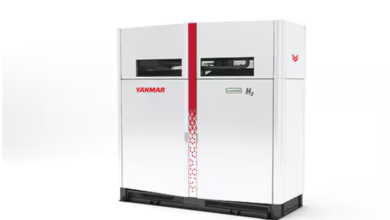ESGL enters into JDA with NMT to convert plastic waste to pyrolysis oil, carbon nanotubes and hydrogen

Genesis Unicorn Acquisition Corp. and Environmental Solutions Group Holdings Limited (“ESGL”) announced that it has entered into a joint development agreement (“JDA”) with Nanomatics Pte. Ltd. (“NMT”) to develop and advance jointly proprietary technologies to convert plastic waste to pyrolysis oil, carbon nanotubes and hydrogen.
ESGL, through its operating entity in Singapore, Environmental Solutions (Asia) Pte. Ltd. (“ESA”), is a sustainable waste solutions provider whose mission is to recycle industrial waste into circular products using innovative technologies and renewable energy.
ESA has developed a proprietary FR-3 Pyrolysis Technology, which converts plastic waste to circular pyrolysis oil. NMT has developed a proprietary THERMO-CVD Process Technology, which converts plastic waste to carbon nanotubes and hydrogen. The two companies have evaluated the economic feasibility of a partnership for the joint development of a process combining their respective strengths to manufacture pyrolysis oil, carbon nanotubes and hydrogen from plastic waste.
The main objective of this JDA is to further develop and apply at scale NMT’s THERMO-CVD Process Technology at ESA’s pilot plant facility to primarily produce carbon nanotubesi and hydrogen from plastic waste and synthetic gas generated using ESA’s FR-3 Pyrolysis Technology.
As Southeast Asia has become a new hub for global supply chains, the environmental cost has continued to mount as higher volumes of hazardous waste and plastics meet underdeveloped waste management systems. In Singapore alone, total plastic waste amounted to 1,001 thousand tonnes with only 6% recycled in 2022, leaving 94% disposed in incineratorsii.
ESGL is helping Singapore in its efforts to transition to a circular, carbon-neutral economic model by converting hazardous waste into circular products that help multinational companies like Shell and Micron meet their Environmental, Social and Governance (ESG) mandates. Specifically, its proprietary FR-3 Pyrolysis Technology converts plastic waste to circular pyrolysis oil in a sustainable manufacturing process, demonstrating their commitment towards resource circularity and actively contributing towards Singapore’s achievement of the UN Sustainable Development Goals.
In 2022, ESGL converted 81,000 kg of plastic waste that otherwise would have been incinerated into circular products such as pyrolysis oil. ESGL expects to double the volume of plastic waste it converts in 2023.
Quek Leng Chuang comments, “Singapore’s recycling rate for plastic waste remains in the single digits. This creates a huge market opportunity for ESGL’s circular solutions, and we have now established ourselves as a reliable partner for some of the most forward-looking companies operating in Singapore, including using our proprietary FR-3 Pyrolysis Technology in supplying circular pyrolysis oil to Shell in Singapore. Carbon nanotubes are widely used in demanding applications such as energy storage and electronics and are excellent additives to improve electric, thermal and mechanical properties.
We look forward to launching our joint development programs in June 2023, exploring a commercially viable process for producing carbon nanotubes and hydrogen from plastic waste, and developing operational synergy between our proprietary technologies to achieve cost efficiencies.”
Dr. Andrei Veksha said, “As a tech start-up specializing in waste management solutions, particularly in the sustainable recycling of plastic waste, we are excited to partner with ESGL in this joint development agreement, leveraging our respective technology strengths and expertise to drive innovation and create value for our society and environment in Singapore and the larger ASEAN region. Singapore is increasingly facing greater urgency to reduce waste and recycle right and to shift from a linear to a circular economy. By combining our resources and working together towards a common goal, i.e., sustainable and profitable recycling of plastic waste into circular end products that have broad industrial applications and great market demand, we are confident that our joint development program will achieve our target objectives and that we are doing our part to combat climate change and ensure that Singapore remains clean, green and liveable.”
